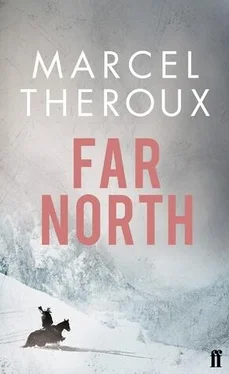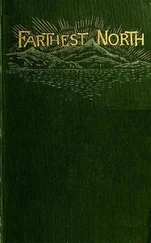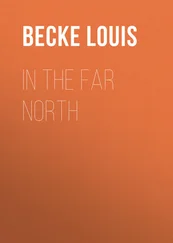There was no warmth in those first rays, but there was something icy and beautiful in the way they sparkled on the bronze head, and lit the red marble of its base, and gleamed on the windows of the big, square buildings that surrounded us on each side.
The head sat on a raised plinth at one side of the square and faced directly east, into the sunrise and out over the old city. As the sun rose higher, the square grew more dazzling bright — three or four acres of blinding, virgin snow. No wonder that bronze head was squinting.
I could see by the tracks in the snow that the prisoners had used the square to orient themselves. It must have been the clearest landmark on the maps they carried. There were tracks entering it at different points on two of its four sides, but all of them exited the same way: westwards, past the two block posts that marked the separation between the new city and the old.
The tallest building in the old city was probably no more than ten storeys or so, but through the spyglass I could make out some on the other side of the block posts that were twice or even three times as high. There was something so heartless and sharp about their shape: plain, straight sides, grey as granite, unadorned with any detail — nothing to tell you they’d been built by a race of men. And even the biggest of those was dwarfed by a blue, metal crane which stood beside it, like a huge headless bird.
You’d think somehow a city would miss its people, that at least it would look incomplete without a line of washing or two, someone idling on a street corner, some children hurrying to school. But Polyn 66 looked no more short of people than a cemetery does. It was perfect just how it stood, all concrete and right angles, and governed by that giant’s head.
To tell the truth, I think the city would have been a little spoiled if it had had people in it. Humans limp and loaf. They slouch, don’t walk in straight lines, spit on the sidewalks. The city I could see through the glass looked like it would stand to attention for eternity.
*
The snow cover was pretty general, but here and there were tufts of brown grass that were tempting to the horse. I couldn’t let her eat anything like that in case it had leeched up poison from the soil so I muzzled her with a feed-bag to keep her from grazing.
I had half a sack of kibble for her which would also take the edge off my hunger, but when that ran out I didn’t like to think how I would keep us both fed. I could eat the horse if it came to it — it wouldn’t be the first time — but it would be a long walk home.
As I scoured the old city for something to melt snow in, I was struck by how orderly it had all been left. Windows were mostly intact. Front doors were shut and padlocked.
On the road back to the bridge was a big yellow mansion. Its front door lay off its hinges, all warped and swollen by the weather. Rags and broken furniture were piled up in the opened passageway. I’d seen similar sights enough times over the years in Evangeline to recognize where someone had broken in looking for firewood.
It was a grand old building with two pairs of columns holding up its portico and the number 1897 laid in tiles beneath it. I found a shower curtain, a pair of rusty ski-poles and the remnant of a fire at the foot of the stairwell.
My first thought was that one of the prisoners had decided to disobey his instructions and shift for himself, and I went on up the stairs half-expecting to run into him. But when I found him in the apartment on the first floor I could see he wasn’t one of ours.
He lay on his front on a big Turkish rug wearing the same fetters on his feet as ours had. I was afraid to touch him, so I turned him over by hooking his arm with an umbrella I found in the hall cupboard.
I’ll never forget how light he felt. It was like a shell with no snail in it. I could only turn him so far, because something on his other arm had suppurated and glued itself to that heavy carpet, but there was no meat left on his face and by the look of it he was a year or two dead.
In the bathroom, I found the remains of a killed pig. That pig might have been what did for him. Mushrooms are the worst food to eat in a poisoned place because their roots are so high and widespread, but pig is scarcely better since mushrooms are what they feed on.
The staircase led up five storeys where there was a second, narrower set of stairs that gave out onto the roof. The light off the snow was dazzling after the gloom inside.
I fell to my knees and licked snow melt right off the slates.
*
The rooftop commanded a view out towards the river. From it, I could clearly see the block post on the bridge and figures moving beyond it. Through the spyglass, I was able to tell the men apart, and I could watch them idling around their camp. They had a small fire going, so they must have found some clean wood somewhere. I knew their heads were hurting from the slow way they dragged themselves about.
Towards eleven, the first prisoners began appearing on the approach to the bridge. I didn’t see them arrive, because I was too busy melting snow from the roof in a pail. The lack of food in the Zone didn’t worry me so much, but without water, the horse and me would die in a couple of days.
The second or third time I went up on the roof I saw the guards had changed into white one-pieces with hoods and masks to cover their faces.
It was hard to keep track of numbers. The guards all looked identical, and the prisoners had been made to sit in rows on the side of the bridge nearest to me.
One by one, they were called forward to hand over whatever they’d found. They stood up, laid down the things they had, and then crossed over to the other side.
When they were done, one of the guards came forward and hosed down the pile of dropped objects with a fumigator he wore strapped to his back. It was a weird-looking thing, something like a cross between a weed sprayer and the smoke machine we used to use to put a hive of bees to sleep.
I was all caught up with watching it when the first shots rang out. The next thing, a couple of the prisoners had broken free and were trying to get back across the bridge, but they could only manage a slow, loping run because of their chains.
There was a volley of shots and one of the prisoners fell down. The other kept going for ten or fifteen yards more. He didn’t fall flat. He slipped down and died upright, but on his knees, like a man at prayer. I’d never seen anyone die like that before. You wouldn’t think gravity would allow it.
The temperature began to drop again as night drew on. The eaves stopped dripping and the slush in the roads hardened into ice.
I’d stabled the horse inside the stairwell, but I was planning to spend the night outside where the air was cleaner, and I could keep an eye on the guards.
From the roof, their fire was a tiny yellow spark in the blackness. The city was so still that an indistinct grunt or laugh occasionally carried all the way across the river.
In the last hour before sunset I broke into an apartment on one of the upper storeys to get a blanket.
The place had been left in perfect order: there was a vase of dried flowers, a pair of sofas with antimacassars, a glassfronted case of books in Russian, a dusty television, a standard lamp with an old frayed wire.
The bed in the main bedroom had been stripped, and on it sat two zipped bags of sheets and blankets. A photograph, a clock, and a copy of the Bible lay on the bedside table.
The second bedroom was half the size of the first and held a single bed.
On the cork board next to the dressing table were photographs of a dark-haired teenager. In some she was ice-fishing, in others eating cotton candy, and standing in the glass bubble of a huge ferris wheel in a city I didn’t recognize.
Читать дальше












